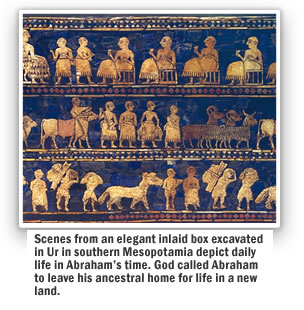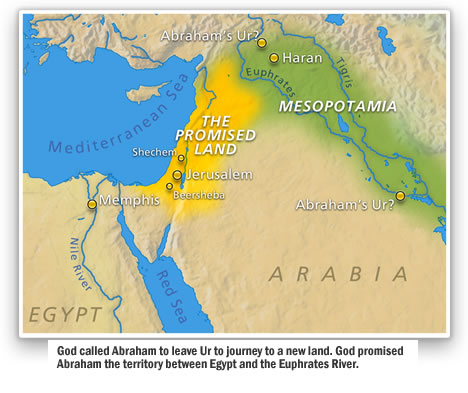

Information Related to "The Sons of Abraham"
 | Audio/Video |
It's impossible to understand the present Middle East without a knowledge of the three great religions that emanate from the area--Judaism, Christianity and Islam.
These three faiths all trace their spiritual roots back to the same individual, Abraham. The towering historical figures behind these three religions-Moses, Jesus Christ and Muhammad-were all direct descendants of Abraham.
 Abraham, born in the Mesopotamian city of Ur, was the son of Terah, a descendant of Shem, a son of Noah. Born almost 4,000 years ago, Abraham's impact on the Middle East is still with us to this day. As a descendant of Noah's son Shem, Abraham and his descendants were a Semitic people. In Genesis 11 we see that Shem's great-grandson Eber (verse 14-16) was a direct ancestor of Abraham, and it is from Eber that the term Hebrew comes.
Abraham, born in the Mesopotamian city of Ur, was the son of Terah, a descendant of Shem, a son of Noah. Born almost 4,000 years ago, Abraham's impact on the Middle East is still with us to this day. As a descendant of Noah's son Shem, Abraham and his descendants were a Semitic people. In Genesis 11 we see that Shem's great-grandson Eber (verse 14-16) was a direct ancestor of Abraham, and it is from Eber that the term Hebrew comes.
Called "the father of the faithful" (compare Romans 4:11), Abraham obeyed God's instruction to leave his native Ur and move to Haran. As Stephen, the devout first martyr of the Christian era, put it: "The God of glory appeared to our father Abraham when he was in Mesopotamia, before he dwelt in Haran, and said to him, 'Get out of your country and from your relatives, and come to a land that I will show you'" (Acts 7:2-3).
Both Ur and Haran were cities in Mesopotamia, which refers to the area between the Euphrates and Tigris rivers. Haran was a natural stopping-off point for Abraham and Sarah, who were about to be sent by God to a new land, a significant turning point in the history of the region.
We read of this move in Genesis 12:1-4, following the death of Abraham's father, Terah. Again, notice his example of unquestioning obedience: "Now the LORD had said to Abram [this being his original name, which was later expanded to Abraham]: 'Get out of your country, from your family and from your father's house, to a land that I will show you. I will make you a great nation; I will bless you and make your name great; and you shall be a blessing ...' So Abram departed as the LORD had spoken to him ..." Hebrews 11:8 adds: "And he went out, not knowing where he was going."
God was working with Abraham to establish him and his descendants in the land of Canaan (later called the Promised Land and often referred to as the Holy Land). At the crossroads of Asia, Africa and Europe, this area was ideal for God's chosen people, who were to be an example to the rest of the world (Deuteronomy 4:5-8).
On arriving in the new land, God promised Abraham that He would give the land to his descendants (Genesis 12:7). "And the LORD said to Abram,... 'Lift your eyes now and look from the place where you are-northward, southward, eastward, and westward; for all the land which you see I give to you and your descendants forever'" (Genesis 13:14-15).
 God added: "And I will make your descendants as the dust of the earth; so that if a man could number the dust of the earth, then your descendants also could be numbered" (verse 16). Significantly, God later changed Abram's name to Abraham (Genesis 17:5). His earlier name meant "high (exalted) father." God renamed him "father of a multitude," saying, "I will make you exceedingly fruitful; and I will make nations of you, and kings shall come from you" (verse 6).
God added: "And I will make your descendants as the dust of the earth; so that if a man could number the dust of the earth, then your descendants also could be numbered" (verse 16). Significantly, God later changed Abram's name to Abraham (Genesis 17:5). His earlier name meant "high (exalted) father." God renamed him "father of a multitude," saying, "I will make you exceedingly fruitful; and I will make nations of you, and kings shall come from you" (verse 6).
At the time these prophecies must have seemed ironic to Abraham, for his wife Sarah was barren. Her infertility was to be very significant in the development of the modern Middle East.
God promised Abraham in Genesis 15:4 that he would have an heir: "one who will come from your own body." Impatient, Sarah told Abraham to take her Egyptian handmaid Hagar and to produce a child by her. This took place "after Abram had dwelt ten years in the land of Canaan" (Genesis 16:1-3).
Abraham's first son is born
"So he went in to Hagar, and she conceived. And when she saw that she had conceived, her mistress became despised in her eyes" (Genesis 16:4). The relationship between Sarah and Hagar quickly deteriorated and Hagar fled.
But a divine message was given to Hagar, telling her to return. It also reassured her that her son would have many descendants-but descendants with traits that would be evident throughout their history: "I will so increase your descendants that they will be too numerous to count ... You are now with child and you will have a son. You shall name him Ishmael ['God hears'], for the LORD has heard of your misery. He will be a wild donkey of a man; his hand will be against everyone and everyone's hand against him, and he will live in hostility toward all his brothers" (verses 10-12, New International Version).
This description of Hagar's descendants is significant because many of today's Arabs are Ishmaelites-descendants of this same Ishmael, whose father was Abraham. Muhammad, the founder and prophet of Islam, was descended from Kedar, one of the 12 sons of Ishmael (Ismail in Arabic). Today 22 nations in the Middle East and North Africa are Arabic nations, most of whose people are adherents of Islam. An additional 35 countries are members of the Islamic Conference, most of them with Islamic governments, but whose people are of different descent.
Even before Ishmael's descendants arrived in the area, the term arab was used to denote the peoples of the Arabian peninsula. With the spread of Islam, Arabs and the Arabic language today encompass a vast region.
The divinely prophetic words spoken to Hagar are still of great significance today. The prophecy that Ishmael "will be a wild donkey of a man" is not meant as an insult. The wild donkey was the aristocrat of the wild beasts of the desert, the preferred prey of hunters. The prophecy is a reference to how Ishmael's descendants would emulate the lifestyle of the wild donkey, leading a free and noble existence in the desert.
"His hand will be against everyone, and everyone's hand against him" similarly refers to this independent lifestyle. Ishmael's descendants have always resisted foreign domination. "He will live in hostility towards all his brothers" is a reference to the enmity that has historically existed among the Arabs and between the Arabs and the other sons of Abraham.
Abraham's second son
Fourteen years after the birth of Ishmael, God blessed Abraham with another son, this time by his wife Sarah. He told them to name their son Isaac (meaning "laughter" for the incredulous reaction they had when told they would have a son at their advanced age as well as the joy that he would later bring to his parents, Genesis 17:17,19; 18:10-15; 21:5-6). Isaac in turn fathered Jacob, also named Israel, the father of the Israelites. Ishmael's and Isaac's descendants are therefore cousins.
"So the child [Isaac] grew and was weaned. And Abraham made a great feast on the same day that Isaac was weaned. And Sarah saw the son of Hagar the Egyptian, whom she had borne to Abraham, scoffing. Therefore she said to Abraham, 'Cast out this bondwoman and her son; for the son of this bondwoman shall not be heir with my son, namely with Isaac'" (Genesis 21:8-10).
This displeased Abraham, who had grown to love Ishmael. "But God said to Abraham, '... Whatever Sarah has said to you, listen to her voice; for in Isaac your seed shall be called" (verse 12). God further reassured Abraham: "Yet I will also make a nation of the son of the bondwoman [Ishmael], because he is your seed" (verse 13). "So God was with the lad; and he grew and dwelt in the wilderness ..." (verse 20).
It cannot be said that Ishmael hated Isaac. But after 14 years as an only child, Isaac's arrival fundamentally changed Ishmael's relationship with his father, Abraham. Afterward, Ishmael felt envy and rivalry toward his half brother, feelings that tribally have survived down through the centuries and which affect the politics of the Middle East today.
Isaac's two sons
Further family complications were ahead. Isaac, in turn, had two sons, Jacob and Esau, twins by his wife Rebekah. Even before they were born, "the children struggled together within her" (Genesis 25:22). God explained: "Two nations are in your womb, two peoples shall be separated from your body; one people shall be stronger than the other, and the older shall serve the younger" (verse 23). Both brothers were to father great nations, a blessing from God to Abraham's grandsons.
Normally the firstborn would receive the birthright, but here it was to be different. The Bible records that Esau sold his birthright to Jacob for a bowl of lentil stew (verses 29-34), showing how little it meant to him. Sometime later, Jacob tricked his father into giving him the birthright blessing (chapter 27). For this, "Esau hated Jacob" (verse 41).
Again, the consequences of this are with us to this day.The descendants of Esau (also called Edom, Genesis 25:30) intermarried with Ishmael's descendants, their bitterness and resentment against Jacob's descendants intensifying through the centuries. Esau's grandson Amalek (Genesis 36:12) was the father of the Amalekites, who became bitter foes of the descendants of Jacob, the 12 tribes of Israel. A prophecy about Amalek foretold endless war between them "from generation to generation" (Exodus 17:16). Some scholars believe that many of today's Palestinians are largely the descendants of the Amalekites.
Let's now turn to the remarkable story of the tribes of Israel-their prophesied rise and fall.
©1995-2022 United Church of God, an International AssociationRelated Information:
Table of Contents that includes "The Sons of Abraham"
Origin of article "The Sons of Abraham"
Keywords: Abraham Abraham, descendants of Ishmael Isaac Esau Amalek
Abraham: